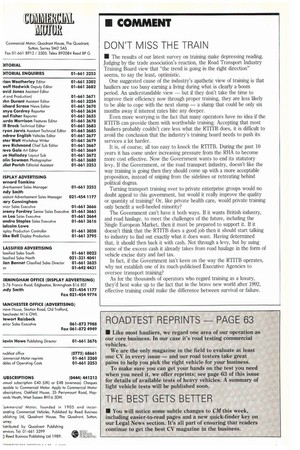• COMMENT DON'T MISS THE TRAIN
Page 5

If you've noticed an error in this article please click here to report it so we can fix it.
• The results of our latest survey on training make depressing reading. Judging by the trade association's reaction, the Road Transport Industry Training Board view that the trend is going in the right direction" seems, to say the least, optimistic, One suggested cause of the industry's apathetic view of training is that hauliers are too busy earning a living during what is clearly a boom period. An understandable view — but if they don't take the time to improve their efficiency now through proper training, they are less likely to be able to cope with the next slump — a slump that could be only six months away if interest rates bite any deeper.
Even more worrying is the fact that many operators have no idea if the RTITB can provide them with worthwhile training. Accepting that most hauliers probably couldn't care less what the RTITB does, it is difficult to avoid the conclusion that the industry's training board needs to push its services a lot harder.
It is, of course, all too easy to knock the RTITB. During the past 10 years it has come under increasing pressure from the RBA to become more cost effective. Now the Government wants to end its statutory levy. If the Government, or the road transport industry, doesn't like the way training is going then they should come up with a more acceptable proposition, instead of sniping from the sidelines or retreating behind political dogma.
Turning transport training over to private enterprise groups would no doubt appeal to this government, but would it really improve the quality or quantity of training? Or, like private health care, would private training only benefit a well-heeled minority?
The Government can't have it both ways. If it wants British industry, and road haulage, to meet the challenges of the future, including the Single European Market, then it must be prepared to support it. If it doesn't think that the RTITB does a good job then it should start talking to industry to find out exactly what it does want. Having determined that, it should then back it with cash. Not through a levy, but by using some of the excess cash it already takes from road haulage in the form of vehicle excise duty and fuel tax.
In fact, if the Government isn't keen on the way the RTITB operates, why not establish one of its much-publicised Executive Agencies to oversee transport training?
As for the thousands of operators who regard training as a luxury, they'd best wake up to the fact that in the brave new world after 1992, effective training could make the difference between survival or failure.




















































































































































